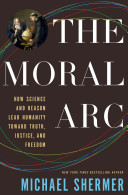2018 School Spending Survey Report
The Moral Arc: How Science and Reason Lead Humanity Toward Truth, Justice, and Freedom
Holt. Jan. 2015. 576p. notes. bibliog. ISBN 9780805096910. $32. SCI
COPY ISBN
VERDICT Shermer's thought-provoking, multidisciplinary book will engage anyone who wishes to understand rationalism as a force for morality. This volume discusses many dark pages in human history; the sensitive reader may prefer Patricia S. Churchland's Braintrust, which covers the neurobiological aspects of morality.
RELATED
ALREADY A SUBSCRIBER? LOG IN
We are currently offering this content for free. Sign up now to activate your personal profile, where you can save articles for future viewing




Comment Policy:
Comment should not be empty !!!